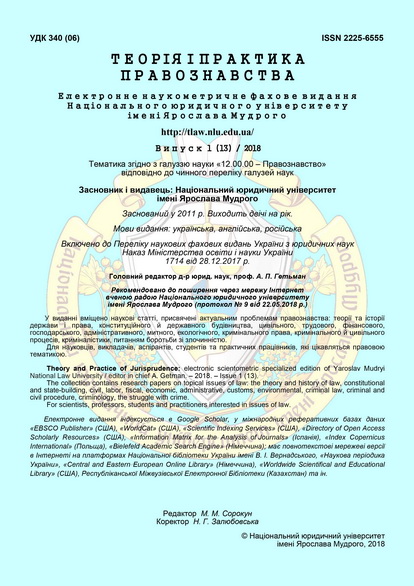Judicial order of appeal of sub-legal normative acts of executive power bodies
DOI:
https://doi.org/10.21564/2225-6555.2018.13.133648Keywords:
by-law normative-legal act, executive power, executive bodies, appeal, proceedingsAbstract
The article deals with the problematic issues of challenging sub-legal normative acts of executive power bodies ofUkraine. Subordinate normative acts of executive power bodies are often issued with the violation of the norms contained in the law, sometimes even contrary to the legislative provisions, their number is constantly growing at a rapid pace, while not differing in the proper quality. At the same time, the quality of legal regulation of public relations in the state, protection of interests, rights and freedoms of citizens depends entirely on the quality of subordinate normative and legal acts, since no matter how perfect the law was not regulated in one or another sphere of public life, without proper implementation of legislative the provisions of the executive authorities, legal regulation can not be effective.
To date,Ukrainehas two ways of resolving administrative and legal disputes - administrative and judicial. Administrative is the possibility of addressing a person whose rights, freedoms and legitimate interests are violated, with a complaint to "the body which directly violated its rights, or to a higher authority", and the court - in the possibility "of the appeal of a natural or legal person with a complaint directly to the court » Taking into account the above, it can be noted that the procedure for appealing sub-legal normative acts can be divided into: 1) administrative, which may include: the abolition of the rule-making body, the abolition of a parent body; the abolition by the body of justice of the decision on the state registration of the regulatory legal act and 2) the court, which may be subject to appeal of regulatory legal acts in court.
It is believed that the court order of appeal has certain advantages over administrative ones. One of the main guarantees of the protection of the rights and freedoms of individuals and legal entities inUkraineis the right to apply to the court if these persons consider that their rights, freedoms and legitimate interests are violated. The issue of the recognition of a legal act illegal or that does not comply with a legal act of higher legal force, is completely or in a separate part assigned to the jurisdiction of administrative courts ofUkraine.
Improvement of the effective legislation on the creation of sub-normative legal acts of executive power bodies and the adoption of a single Law of Ukraine "On normative-legal acts" will help to eliminate and prevent further violations and inconsistencies in the creation of normative legal acts, correspondingly, to reduce the number of legal acts, norms which will be challenged, and as a consequence – an increase in the authority of the authorities and the stateReferences
Konstytutsiia Ukrainy: Zakon vid 28.06.1996 r. № 254k/96-VR. (1996). URL: http://zakon5.rada.gov.ua/laws/show/254-80.
Pro Kabinet Ministriv Ukrainy: Zakon Ukrainy vid 07.10.2010 r. № 2591. (2010). URL: http://zakon2.rada.gov.ua/laws/show/794-18.
Deiaki pytannia orhanizatsii roboty ministerstv, inshykh tsentralnykh orhaniv vykonavchoi vlady: Ukaz Prezydenta Ukrainy vid 24.12.2010 r. № 1199. (2010). URL: http://zakon0.rada.gov.ua/laws/show/1199/2010.
Pro tsentralni orhany vykonavchoi vlady: Zakon Ukrainy vid 17.03.2011 r. № 3166. (2011). URL: http://zakon0.rada.gov.ua/laws/show/3166-17.
Pro mistsevi derzhavni administratsii: Zakon Ukrainy vid 09.04.1999 r. № 586-XIV. URL: http://zakon0.rada.gov.ua/laws/show/586-14.
Riabchenko, Ya.S. (2011). Oskarzhennia normatyvno-pravovykh aktiv v administratyvnomu sudochynstvi. Extended abstract of candidate’s thesis. Kharkiv [in Ukrainian]
Kodeks administratyvnoho sudochynstva Ukrainy vid 06.07.2005 r. №2747-IV. (2005). URL: http://zakon5.rada.gov.ua/laws/show/2747-15.
Blazhivska, N. (2009). Protsedura rozghliadu sprav pro oskarzhennia normatyvno-pravovykh aktiv potrebuie vdoskonalennia. Visnyk Vyshchoho administratyvnoho sudu Ukrainy, 1, 64–66 [in Ukrainian].
Hetman, Ye.A. (2013). Oskarzhennia normatyvno-pravovykh aktiv v sudovomu poriadku. Nauka i pravookhorona., 4 (22), part. 2, 121–125 [in Ukrainian].
Pro poriadok ofitsiinoho opryliudnennia normatyvno-pravovykh aktiv ta nabrannia nymy chynnosti: Ukaz Prezydenta Ukrainy vid 10.06.1997 r. № 503/97. (1997). URL: http://zakon5.rada.gov.ua/laws/show/503/97.
Pro opublikuvannia aktiv zakonodavstva Ukrainy v informatsiinomu biuleteni «Ofitsiinyi visnyk Ukrainy»: Ukaz Prezydenta Ukrainy vid 13.12.1996 r. № 1207/96. (1996). URL: http://zakon5.rada.gov.ua/laws/show/1207/96.
Mkrtchian, R.S. (2009). Mistseva derzhavna administratsiia yak storona v administratyvnykh spravakh shchodo oskarzhennia normatyvno-pravovykh aktiv mistsevykh orhaniv vykonavchoi vlady. Pravo i bezpeka, 1, 166–170 [in Ukrainian].
Prysiazhniuk, A.Y. (2012). Pravove rehuliuvannia administratyvnoho oskarzhennia rishen orhaniv vykonavchoi vlady. Aktualni problemy zabezpechennia praktychnoi spriamovanosti pidhotovky kadriv dlia orhaniv vnutrishnikh sprav Ukrainy: Proceedings of the Scientific and Practical Conference. Kharkiv: KhNUVS, 128–130 [in Ukrainian].
Mytnyi kodeks Ukrainy vid 13.03.2012 r. № 4495-VI (iz zminamy). (2012). URL: http://zakon3.rada.gov.ua/laws/show/4495-17.
Podatkovyi kodeks Ukrainy vid 02.12.2010 r. № 2755-VI (iz zminamy). (2010). URL: http://zakon3.rada.gov.ua/laws/show/2755-17/page.
Zui, V.V. (2012). Problemni pytannia shchodo oskarzhennia normatyvno-pravovykh aktiv. Visnyk Zaporizkoho natsionalnoho universytetu, 1 (1), 105–109 [in Ukrainian].
Dukhnevych, O.S. (2009). Osoblyvosti provadzhennia v administratyvnykh spravakh shchodo oskarzhennia normatyvno-pravovykh aktiv, pryiniatykh sub’iektamy vladnykh povnovazhen. Pravo i suspilstvo, 6, 66–69 [in Ukrainian].
Pro Konstytutsiinyi Sud Ukrainy: Zakon Ukrainy vid 13.07.2017 r. № 2136-VIII. (2017). URL: http://zakon3.rada.gov.ua/laws/show/2136-19/page
Downloads
How to Cite
Issue
Section
License
Copyright (c) 2018 Theory and practice of jurisprudence

This work is licensed under a Creative Commons Attribution 4.0 International License.




